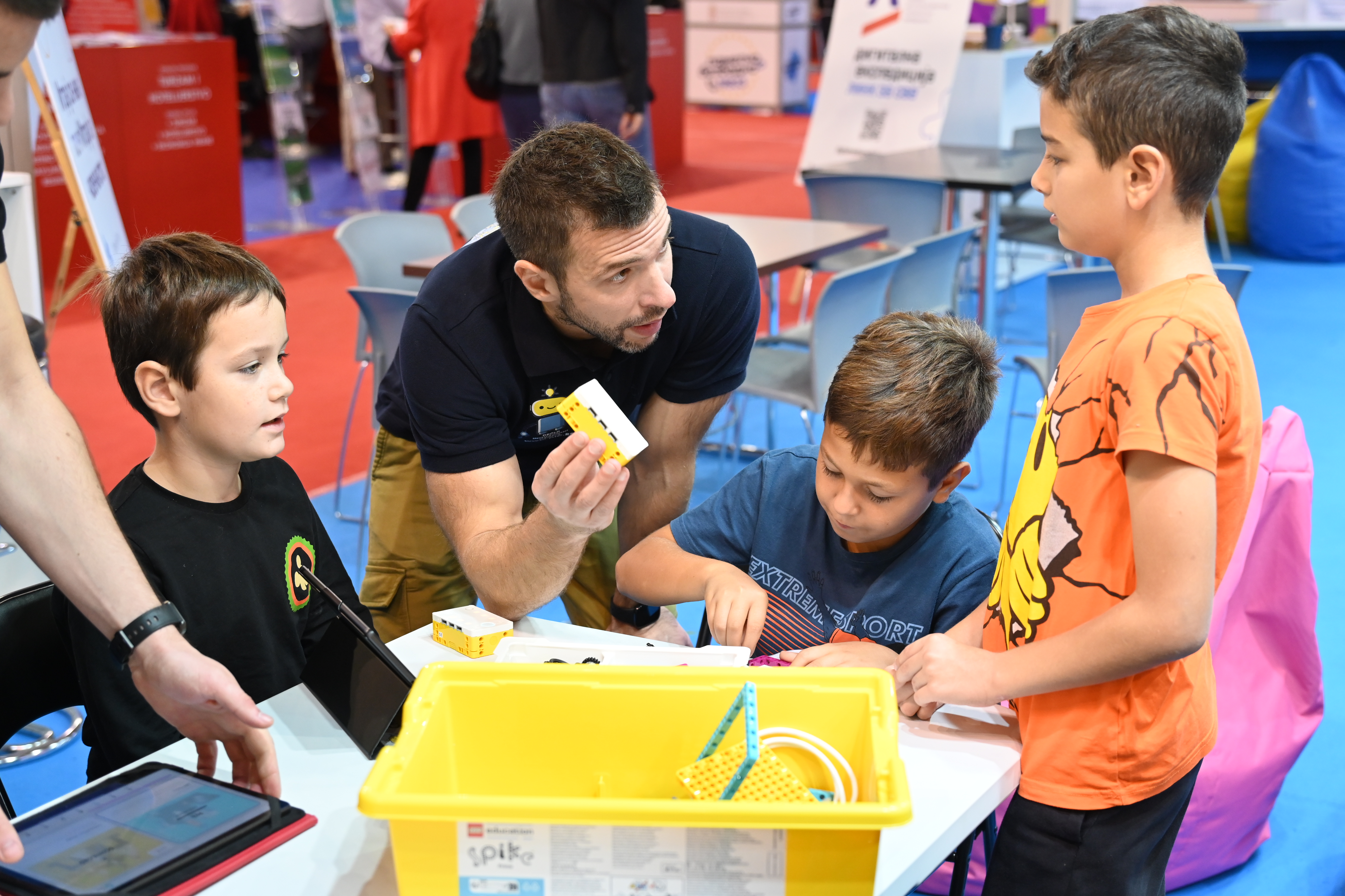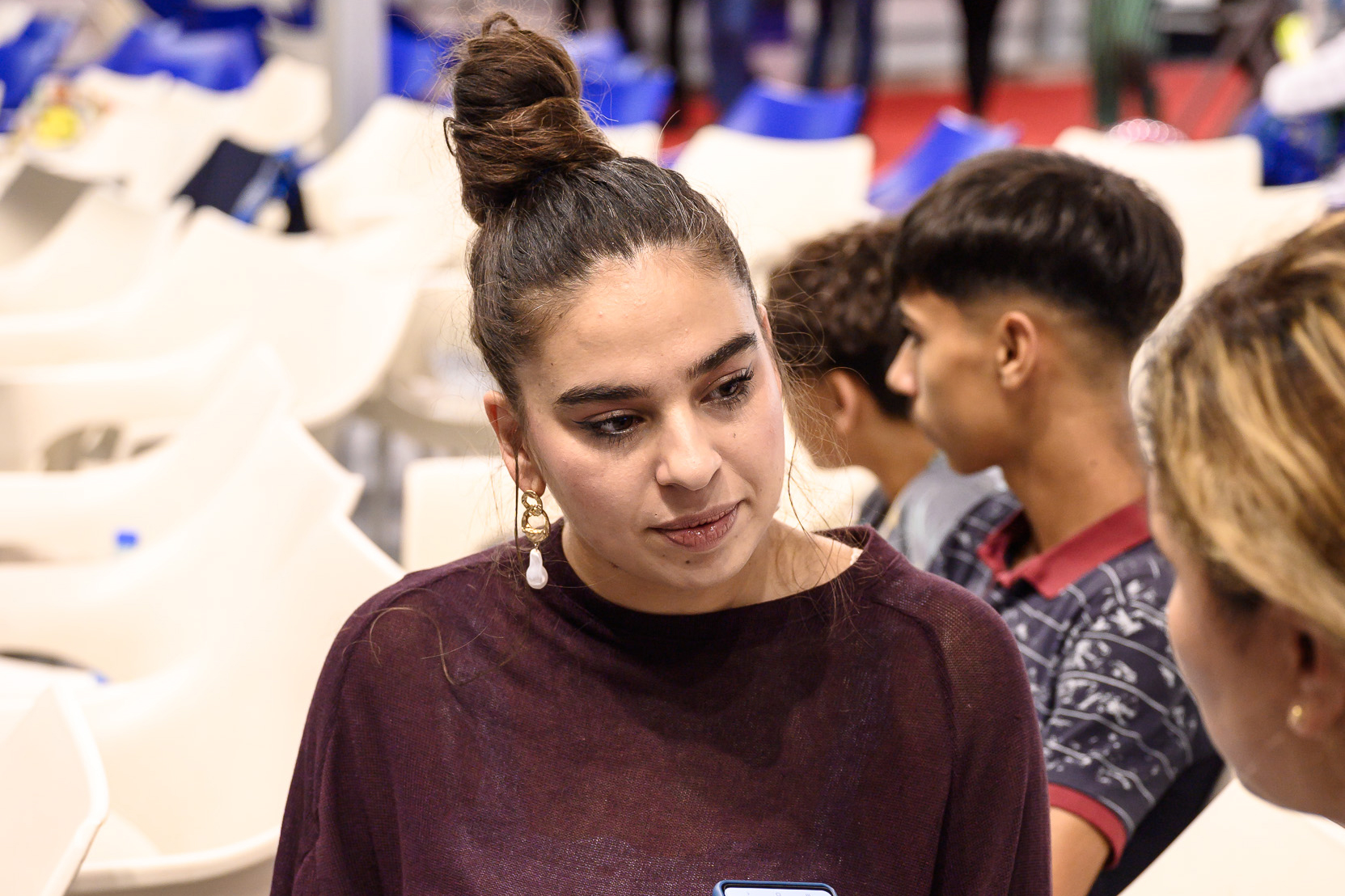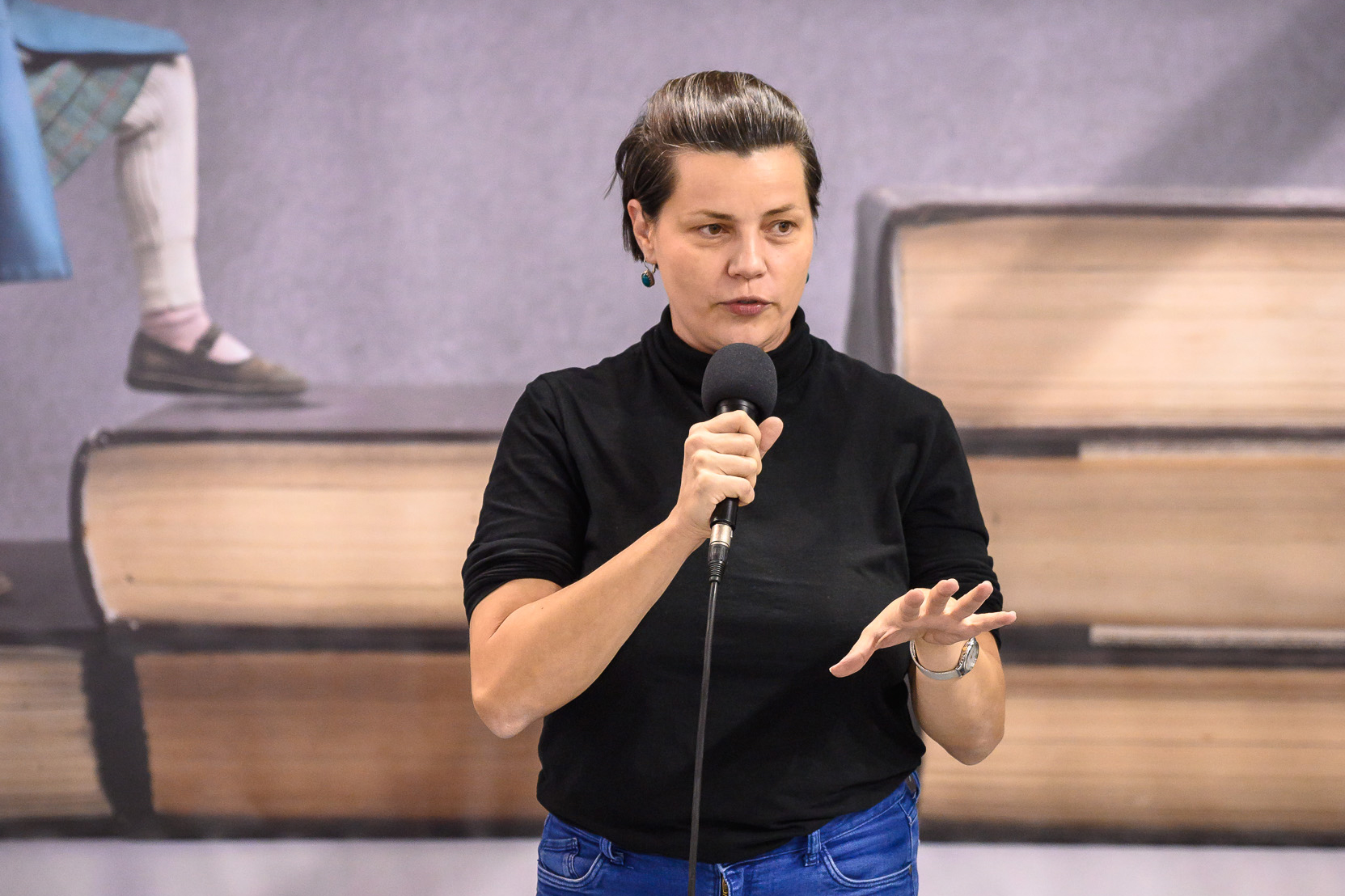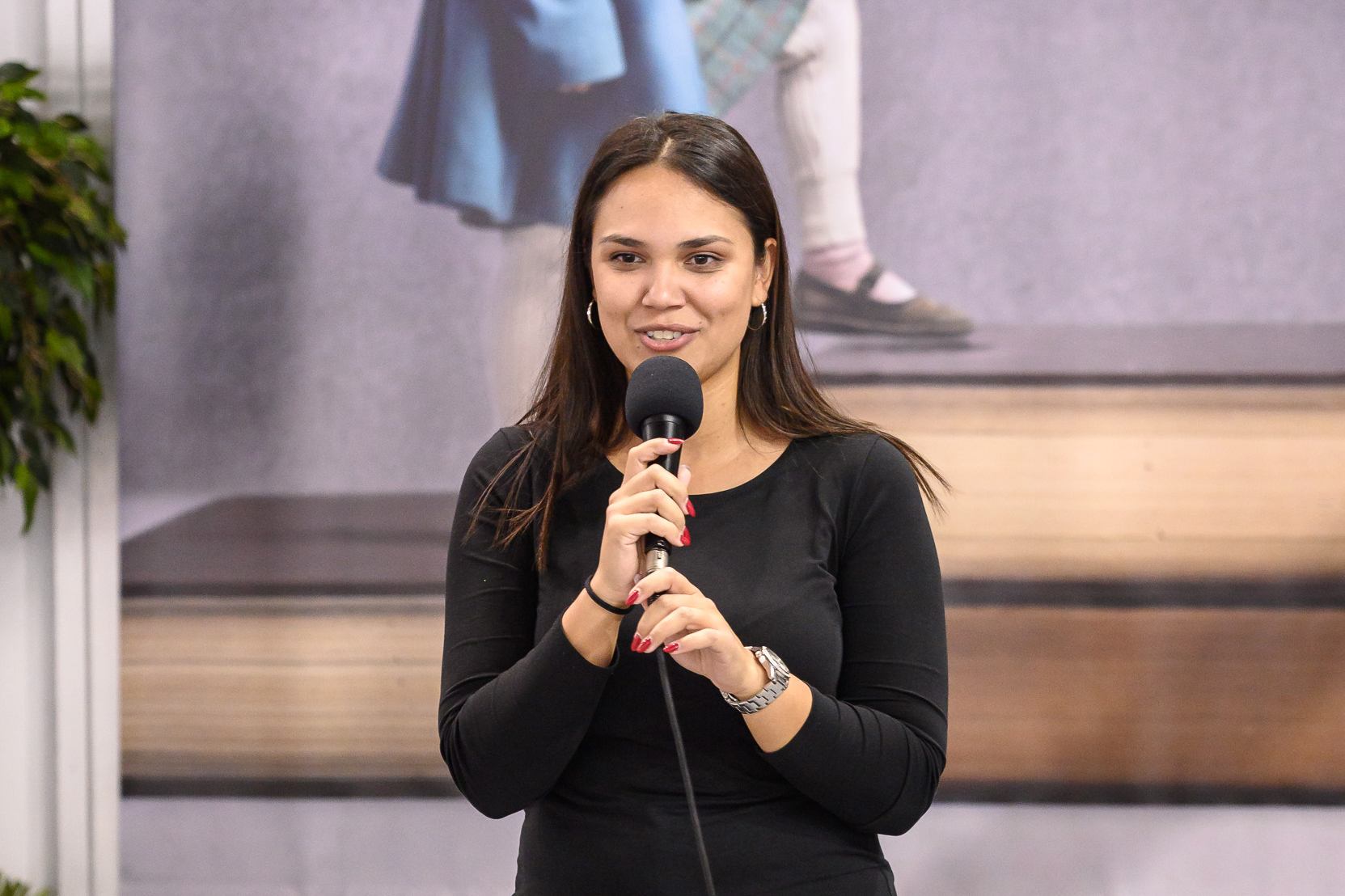Digital Skills to Better Education
December 1, 2023

Students at the workshop
Digital skills were an important part of the programme at the 52nd Education and Teaching Tools Fair, attended by students and teachers coming from around 60 preschool institutions, including primary, secondary, vocational, musical, and art schools.
“We’re here programming a Lego robot. When we are done, the robot will be controllable; it will actually come to life”, nine-year-old Aleksandra Savić explains breathlessly. She is learning the work of engineers through playing with her friends Mia and Katarina.

Aleksandra Savić, 3rd grader (left)
“This is all very interesting. We came here to play and have fun,” Sergej Petrović says honestly. “But we should also do some programming” his friend Danilo Borisavljević cannot wait to jump in. “It’s not that hard," both of them quip in one voice. Teacher Maja Arsenović brought these ‘OŠ Janko Veselinović’ third graders, together with some other 20 students, to the micro:bit workshop.

Sergej Petrović and Danilo Borisavljević, 3rd graders
She says students’ experiences vary a lot when it comes to digital skills, since not everyone even has a computer at home. They try to overcome these differences in school. “Children who do not possess their own digital devices can work on a common device in our school library. They can always have a friend come over to help them there, as well as any of us adults at the school.”
Maja believes teachers could also use some additional training to be more confident in introducing children to digital literacy before they start developing it in IT class.
“Children often use digital devices only to play. My colleagues and I often wonder how we can teach them to use digital devices to find out about new things."

Maja Arsenović, teacher at ‘Janko Veselinović’ primary school
Alongside numerous advantages, the world of digital technologies also carries some risks for children, especially in the online realm. One of the workshops at the education fair was dedicated to cyberbullying prevention. "I learn more about it with my friends because we talk about it sometimes at school as well," fourteen-year-old Milica Jovanović says. This student at ‘OŠ 14. oktobar’ primary school from Barič was one of the best among her peers in an online and social network safety quiz. When using social networks, Milica is cautious; she uses strong passwords; she does not share her location; she does not have unlocked accounts; but she also believes children are underprotected online. Because they don’t always take care, but also because there is no one to constantly warn them of the dangers. When asked if she can visualise a future without TikTok, Snapchat, and Instagram, her reply is somewhat surprising: "Yes, I can. And that future would be better. I believe I, for one, spend way too much time on social networks."
The experience of Igor Jurić, head of the Centre for Missing and Abused Children, is that coming face-to-face with children is the most efficient way. “Most children who reported violence came to these meetings.” He speaks about possible threats and dangers for children in a digital world, adapting to those he teaches about safety: “Today I am on 24 different social networks. I have to be present on a network that captures as little as 0.5% of the population to keep up with the children. I play a myriad of games, and it does consume a lot of time and energy, but if you want to adequately parry children when you come to these workshops, you simply have to know more than they do," Jurić says. Oftentimes, children do not understand the language of adults, but they engage in conversations on difficult topics when they are explained in an appealing way. They thronged to see the short films based on true stories. “When you meet a kid at school or when they reach out, write a message: thank you; I recognised the situation you talked about or saw it in one of the films; then you understand you did a great deal of work,” Igor Jurić concludes.

The part of the programme dedicated to breaking social stereotyping
Some of the programmes at the fair were dedicated to breaking social stereotypes that exist both in real life and online. Zlata Ristić, who works with Roma children and youth, brought children from the GRUBB* foundation to an interactive performance of "How much more of this?" “We try to tear down the Roma cliches with song and dance. We fight for equality and freedom so that at least our future generations don’t constantly have to make the same points, so they can live normal lives in the 21st century," Zlata says.

Zlata Ristić, ‘Pretty Loud’ band member
The children understood the real-life stories performed by the Young Volunteers’ Association members: the story of Fatima, a Syrian girl living in exile, and Elvis, a Roma youth falsely accused of stealing.
Drama teacher/actress Branka Bajić Jovanov was not surprised by the children’s honest reaction or their desire to engage actively with the play, change its course through their interventions, and fight racism, hatred, and discrimination: “Children have this naivete, if I may say so from the perspective of an adult, but they also think straight. They ask ‘why’? Just because someone comes from a different country? Because their skin colour is different? They don’t understand these divisions and this type of behaviour at all, and that’s wonderful because we completely forgot about it.”

Branka Bajić Jovanov, drama teacher/actress
Monika Ajvazović from the Young Volunteers’ Association believes children can always be positively influenced: “Get righteousness in them going so tomorrow they can be righteous adults." And she is acting on her life experience: “We mostly do volunteer work because we are facing discrimination on a daily level.” Digital skills play an important part in reducing social inequalities as well, since, as part of the curriculum, they provide children from all social backgrounds with opportunities for a better future.

Monika Ajvazović, Young Volunteers’ Association
This year’s Education and Teaching Tools Fair was held under the motto of ‘Make the World a Better Place’. The event was held under the auspices of the Ministry of Education that presented schools and partners - including the United Nations Development Programme (UNDP) - on their stand. UNDP is working with the Ministry on strengthening digital competencies of primary school teachers and students through supporting the development of teaching resources, holding a summer programming school and winter programming support programme, implementing the STE(A)M challenge for high school students and teachers, holding teacher training sessions, as well as workshops and presentations for students.
*GRUBB - Gypsy Roma Urban Balkan Beats

 Locations
Locations